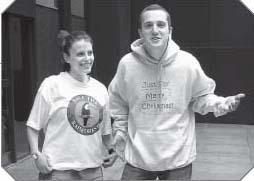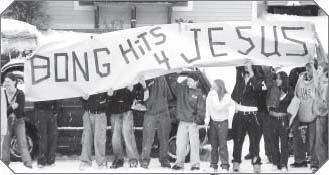Kids Are Americans Too (5 page)
Read Kids Are Americans Too Online
Authors: Bill O'Reilly

Whatever your opinion, this whole thing is going to be a very large part of your life. It's going to be one of the hottest debates about rights for your future in America. Just think about it in those terms, okay?

ASK O'REILLY!
(A Special Feature)
You: I want to wear a T-shirt at school that says
SAVE THE MANATEES!
O'Reilly: That's a nice thought.
You: You bet it is! But my principal says it's a political slogan, and if he allows one, he has to allow all of the others.
O'Reilly: And some of those can get pretty roughâ¦
You: So what? Don't I have the right to express myself in a decent way? Anyway, what would happen if I took the school to court and said the principal was denying my rights under the First Amendment?
O'Reilly: I dunno.
You: You dunno?
O'Reilly: (rolling eyes) Look, let's skip the next bit, okay? We'll cut to the chaseâ¦See, I don't know the judges who are sitting on the court in your stateâ¦Haven't heard anything about them, or what they think, or what decisions they've made in the past.
You: But this is a matter of law!
O'Reilly: (smiles sagely)
You: Well, isn't it?
O'Reilly: (smiles even more sagely)
You: Okay, I think I get itâ¦Laws are made by human beings.
O'Reilly: And?
You: They're also interpreted by human beings.
O'Reilly: And so�
You: Well, even though I think it's clearly freedom of speech for me to wear a T-shirt that expresses my view, my right under the Constitutionâ¦

Does this pass the dress code?
O'Reilly: Even so, some judges might agree with you. Others might not.
You: This could make me dizzy.
O'Reilly: Watch my program. You'll meet quite a few peopleâon all sides of the issuesâwho are confused by this stuff. I mean, they're nuts! But you can figure it out. I have faith.
You: Really?
O'Reilly: Really. You just have to keep your head,
learn the rules and how they work, seek sane advice, and try to make sense of the arguments on the other side. Why is your principal so stubborn about the T-shirt? Understand his sideâ
You: But I want to wear theâ
O'Reilly: Hey! I didn't say “agree” with his point of view. Understand where he's coming from. Then maybe you can make your view understandable to him. Maybe you can even persuade him.
You: You think I could win that argument?
O'Reilly: I dunno.
You: Okay, okay, I get it.
O'Reilly: See?
But it's never that simple.
Did you hear the story about the kid who thought it was his right of free speech to put up a fourteen-foot-long banner reading
BONG HITS 4 JESUS
? I'm not making this up. (Uh, if you're exceptionally innocent, maybe I should explain that the phrase has to do
with using marijuana. By the way, being innocent about drugs is not a bad thing. But knowing the score may protect you better.)

A question 4 the Supremes? © Clay Good/ZUMA Press
Back to our storyâ¦
Joseph Frederick, an eighteen-year-old senior at Juneau-Douglas High School in Alaska, displayed the banner as students of the school assembled outside to watch runners in the 2002 Olympics torch relay as they raced down the road. The principal, Deborah Morse, had the banner taken down and immediately suspended the kid for ten days.
As we will see again and again, things are not always exactly clear-cut.
See, the kid argued that he was not on school property, since everyone had gathered in the street outside. The principal shot
back that the event was sponsored by the school, even though it took place on the sidewalk, so she had the right to get rid of the sign and punish him. The kid argued that he had the right to express his opinion about cannabis (yes, he was for it). Ms. Morse countered that his message undermined the school's educational mission and flew in the face of its antidrug stance. (True enough.) That, in her view, meant that she could keep Frederick from making his statement.
You noticed that I said “2002,” right? But this case isn't over yet. When Frederick sued, a local court agreed with the school. Then a federal appeals court agreed with Frederick, saying that the school could not “punish and censor nondisruptive speech.”
There's more. Now the Supremes have agreed to take the case. (By the way, the lawyer representing the school is Ken Starr, whom some of you may rememberâI know, I know, just barelyâfrom the Monica Lewinsky affair.)
This case is not just a matter of pride, by the way. If the school loses in the end, damages will have to be paid to Frederick.
What will happen? I don't know, although I'd guess that the current lineup of judges will side with the school. Whatever happens, you can be sure that I'll be talking about it on
The Factor.
As for Frederick, he has said that he put up the banner so that it would be seen on TV. He sure got his wish. But judging by his slogan, Fred is a pinhead. Jesus and pot have nothing in common. This is just a case of a wiseguy making trouble.
But the Supreme Court is hearing it! That means, taking it seriously!
!NEWS FLASH!
Yes, this really is a flash. Just as this book was sent off to the printer this past summer, the Supremes suddenly came down from the heights and spoke their several minds.
Â
You're going to love this, especially after everything we've talked about. Better yet, you're going to understand it, precisely because of everything we have talked about. It's a great, right-here-and-now example of how complicatedâand fascinatingâthe continuing story of rights in America can be.
Â
If we could just cut to the chase, the box score would be Principal Morse 5, Joseph Frederick 4 (or 5 1/2 to 3 1/2, as you will see). Bottom line: Joseph's “prank” was not free speech protected by the First Amendment, according to the majority of the Supremes, and Ms. Morse does not have to pay damages to the kid because, to use the legal language, as a government official she is entitled to “qualified immunity” from liability.
Â
So has everything about this case been cleared up now? Is everyone all across the land dancing
happily through the streets, hand in hand, blowing bubbles to the same tune on our iPods?
Â
You know better. Or you've been dozing off while reading this book.
Â
As it turns out, this case took some crazy twists and turns, even after all we've already discussed and thought about. Get this: The ACLUâfervent advocates of perfectly free speechâwas actually joined in their concern over this case by conservative religious groups like the American Center for Law and Justice (that would be a Pat Robertson entity).
Â
What? Did Jesus really do bong hits back in the old days, pastor?
Â
No. But think a little about this. The left believes that you have the right to state in school (or to argue in the school newspaper) that marijuana is a good thing. The right does not believe that (typically). But some conservatives were afraid that if Joseph Frederick wasn't permitted to preach in favor of getting stoned, a fundamentalist Christian kid couldn't speak out against
abortion, premarital sex, evolutionary thought, or gay marriage, either.
Â
So some people on the right supported Joseph even though they deplored what he did?
Â
You got it. You may not yet have learned the old expression “Politics makes strange bedfellows,” but you just saw an example of what that expression refers to.
Â
How can you be allowed to say “Bong Hits 4 Jesus” and also “It was Adam and Eve, not Adam and Steve” in the same breath?
Â
Welcome, once again, to the puzzle of rights in this country.
Â
So, as you've guessed, neither side was completely happy with the court's decision. And the judges weren't happy, either. I'm not going into all of the details, which could (hint) make quite a term paper, but here's a quick rundown.
Â
On the anti-Joseph team, Supreme Court top judge John G. Roberts Jr. argued that the princi
pal had the right to suspend the kid because “failing to act would send a powerful message to the students” that, in effect, the school wasn't really serious about fighting drug use. (He did note that the message on the banner was “cryptic” and “gibberish,” though.) Three more judges agreed with his decision, without comment, but the fifth, Justice Clarence Thomas, was moved to add that “in light of the history of public education,” students (and that means you) have no right of freedom of speech in school under the First Amendment. None. Nada.
Â
Then there was Justice Stephen G. Breyer. He didn't think that the principal should have to pay damages (1/2 vote for the principal), but he argued that the Supreme Court should have stayed away from the discussion of the First Amendment (1/2 vote for young Frederick). Might confuse things, he opined. Apparently, Judge Breyer wanted the controversy to be seen as an “authority” issue, not a “free speech” issue. It is easier to define what a school principal can legally do than to define what an American kid can legally say.
Justice John Paul Stevens, who wrote the opinion for the four (or 3 1/2) dissenting judges, was pretty funny. He argued that the majority was just making up a special free speech exception for any mention of drugs. With tongue firmly in cheek, he asked whether or not the decision would have been different if the offending banner had read, “Wine Sips 4 Jesus.” That, he wrote, could be read as both pro-wine and pro-Christianity. (If you haven't heard about the Christian rite of communion, look it up.) But Stevens certainly understood the subversive message Joseph put out there; he just didn't think it was that big a deal.
So where are we?
Hard to say. All I can tell you with certainty is this: There will be more court cases, leading to more decisions that will perhaps cause even more controversy (or not)â¦There will be attempts in Congress to define the issues of the decision with new legislationâ¦And the world, including me, will opine!
Most important, youâalong with your friends and parents and teachersâwill have to figure out how this decision affects your daily life. So, in case you ever thought Washington, D.C., was far away, think again. The Supremes are in your face, for better or worse. Even when you're trying to decide what to say or write in school, they're looking over your shoulder. You have a lot to think aboutâ¦
Oh, one other thingâ¦young Joseph Frederick, the high school student in this case, is now twenty-three years old. That says a lot. Your rights take time to define. Yes, I am a poet.